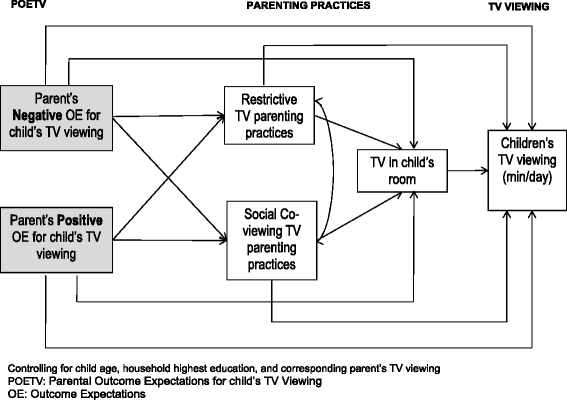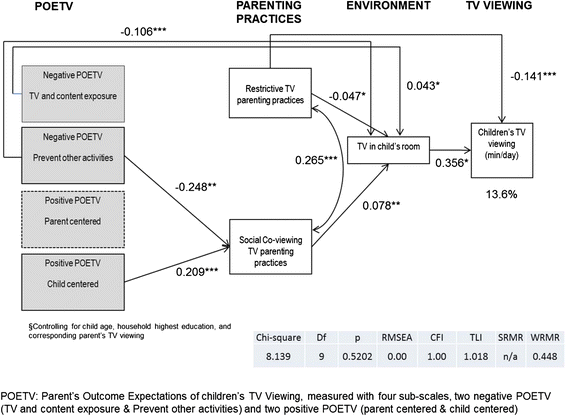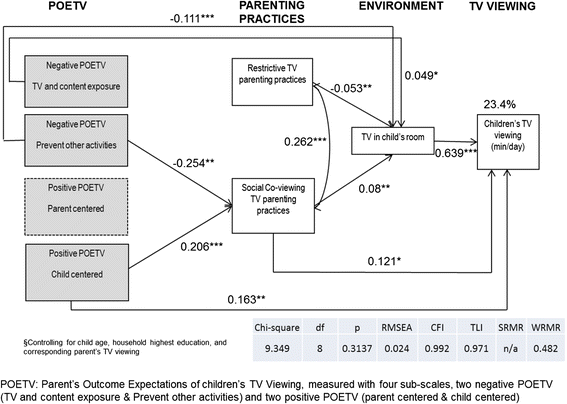The association of parent's outcome expectations for child TV viewing with parenting practices and child TV viewing: an examination using path analysis
- PMID: 26013560
- PMCID: PMC4456715
- DOI: 10.1186/s12966-015-0232-2
The association of parent's outcome expectations for child TV viewing with parenting practices and child TV viewing: an examination using path analysis
Abstract
Background: Television (TV) viewing has been associated with many undesirable outcomes for children, such as increased risk of obesity, but TV viewing can also have benefits. Although restrictive parenting practices are effective in reducing children's TV viewing, not all parents use them and it is currently unclear why. The current study examined parenting practices related to TV viewing in the context of social- cognitive theory. Specifically, we hypothesized that positive and negative Parental Outcome Expectations for child's TV Viewing (POETV) would be associated with social co-viewing and restrictive parenting practices, and that POETV and parenting practices influence the amount of TV viewed by child.
Method: Data were collected from an internet survey of 287 multi-ethnic parents and their 6-12 year old children on participants' sociodemographic information, parenting practices related to TV use, POETV, and parent and child TV viewing. Path analysis was used to examine the relationship amongst variables in separate models for weekday and weekend TV viewing. controlling for child age, household education, and parental TV viewing.
Results: The results provided partial support for the hypotheses, with notable differences between weekday and weekend viewing. The models explained 13.6% and 23.4% of the variance in children's TV viewing on weekdays and weekends respectively. Neither positive nor negative POETV were associated with restrictive TV parenting in either model. One subscale each from positive and negative POETV were associated with social co-viewing parenting on both weekends and weekdays in the expected direction. Restrictive parenting practices were directly negatively associated with children's TV viewing on weekdays, but not weekends. Social co-viewing parenting was directly positively associated with children's TV viewing on weekends, but not weekdays. The strongest influence on children's TV viewing was having a TV in the child's bedroom. Negative POETV was weakly associated with having a TV in the child's room.
Conclusions: These findings suggest that POETV and parenting may have a greater impact on weekend TV viewing, when children tend to watch more TV, than weekday. The models suggest that POETV, parenting and especially removing the TV from children's rooms may be promising targets for interventions.
Figures



Similar articles
-
Psychometric validity of the parent's outcome expectations for children's television viewing (POETV) scale.BMC Public Health. 2014 Aug 31;14:894. doi: 10.1186/1471-2458-14-894. BMC Public Health. 2014. PMID: 25175279 Free PMC article.
-
Hispanic parents of overweight and obese children and their outcome expectations for children's television viewing: a qualitative study.J Nutr Educ Behav. 2013 Nov-Dec;45(6):718-22. doi: 10.1016/j.jneb.2013.04.263. Epub 2013 Jul 11. J Nutr Educ Behav. 2013. PMID: 23850016
-
Parental control, nurturance, self-efficacy, and screen viewing among 5- to 6-year-old children: a cross-sectional mediation analysis to inform potential behavior change strategies.Child Obes. 2015 Apr;11(2):139-47. doi: 10.1089/chi.2014.0110. Epub 2015 Jan 13. Child Obes. 2015. PMID: 25584518 Free PMC article.
-
Influencing factors of screen time in preschool children: an exploration of parents' perceptions through focus groups in six European countries.Obes Rev. 2012 Mar;13 Suppl 1:75-84. doi: 10.1111/j.1467-789X.2011.00961.x. Obes Rev. 2012. PMID: 22309066 Review.
-
How parental dietary behavior and food parenting practices affect children's dietary behavior. Interacting sources of influence?Appetite. 2015 Jun;89:246-57. doi: 10.1016/j.appet.2015.02.012. Epub 2015 Feb 11. Appetite. 2015. PMID: 25681294 Review.
Cited by
-
Associations of parental attitudes and health behaviors with children's screen time over four years.BMC Public Health. 2023 Feb 8;23(1):289. doi: 10.1186/s12889-023-15212-x. BMC Public Health. 2023. PMID: 36755324 Free PMC article.
-
Mothers' and fathers' media parenting practices associated with young children's screen-time: a cross-sectional study.BMC Obes. 2018 Dec 3;5:37. doi: 10.1186/s40608-018-0214-4. eCollection 2018. BMC Obes. 2018. PMID: 30524742 Free PMC article.
-
Understanding differences between summer vs. school obesogenic behaviors of children: the structured days hypothesis.Int J Behav Nutr Phys Act. 2017 Jul 26;14(1):100. doi: 10.1186/s12966-017-0555-2. Int J Behav Nutr Phys Act. 2017. PMID: 28747186 Free PMC article.
-
Parent-perceived neighbourhood environment, parenting practices and preschool-aged children physical activity and screen time: a cross-sectional study of two culturally and geographically diverse cities.BMC Pediatr. 2022 May 27;22(1):309. doi: 10.1186/s12887-022-03377-0. BMC Pediatr. 2022. PMID: 35624474 Free PMC article.
-
Screen-Related Parenting Practices in Low-Income Mexican American Families.Acad Pediatr. 2018 Sep-Oct;18(7):820-827. doi: 10.1016/j.acap.2018.05.002. Epub 2018 May 17. Acad Pediatr. 2018. PMID: 29777781 Free PMC article.
References
-
- Bernard-Bonnin AC, Gilbert S, Rousseau E, Masson P, Maheux B. Television and the 3- to 10-year-old child. Pediatrics. 1991;88(1):48–54. - PubMed
-
- Dietz W. Physical activity and childhood obesity. Nutrition. 1991;7(4):295–6. - PubMed
-
- Hall ER, Etsy ET, Fisch SM. Television and children’s problem-solving behavior: a synopsis of an evaluation of the effects of square one TV. J Math Behav. 1990;9(2):161–74.
-
- Rice ML, Huston AC, Truglio R, Wright JC. Words from “Sesame Street”: learning vocabulary while viewing. Dev Psychol. 1990;26(3):421–8. doi: 10.1037/0012-1649.26.3.421. - DOI
-
- Linebarger DL, Kosanic AZ, Greenwood CR, Doku NS. Effects of viewing the television program Between the Lions on the emergent literacy skills of young children. J Educ Psychol. 2004;96(2):297–308. doi: 10.1037/0022-0663.96.2.297. - DOI
Publication types
MeSH terms
LinkOut - more resources
Full Text Sources
Other Literature Sources
Medical

